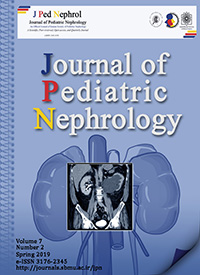Clinical Effects of Methylphenidate Compared to Oxybutynin on Management of Giggle Incontinence
Journal of Pediatric Nephrology,
Vol. 7 No. 2 (2019),
31 August 2019
,
Page 1-3
https://doi.org/10.22037/jpn.v7i2.25546
Abstract
Background and Aim: Giggle incontinence, also known as “enuresis risoria”, is characterized by unexpected, involuntary, and complete bladder voiding in response to laughter. The cause is unknown; however, there are different assumptions based on several case studies. This research discusses the effectiveness of methylphenidate for giggle incontinence in children.
Methods: Fifteen girls who met the giggle incontinence criteria were randomly divided to two groups: group A (n=8 girls) and group B (n=7 girls). The participants in group A took Oxybutynin chloride and the patients in group B received methylphenidate for one month. The response of the two groups to drugs was assessed.
Results: Group A included 8 girls (mean age: 7.7 years) and group B comprised 7 girls (mean age: 8.4 years). Only one patient in group A showed complete response to Oxybutynin chloride. No wetting was reported by six patients in group B.
Conclusion: Giggle incontinence is a rare form of incontinence. The pathophysiology is unfortunately unknown yet. Methylphenidate may be suggested for symptomatic relief compared to Oxybutynin chloride until the etiology of the disease is more clearly defined.
Keywords: Giggle incontinence; Giggle micturition; Laughter incontinence; Enuresis.- Giggle incontinence
- Giggle micturition
- Laughter incontinence
- Enuresis.
How to Cite
References
Richardson I, Palmer LS. Successful treatment for giggle incontinence with biofeedback. J Urol 2009;182(4):2062-6.
Berry AK, Zderic S, Carr M. Methylphenidate for giggle incontinence. J urol 2009; 182(4):2028-32.
Logan BL, Blais S. Giggle incontinence: evolution of concept and treatment. J Pediatr Urol 2017;13(5):430-5.
Chandra M, Saharia R, Shi Q, Hill V. Giggle incontinence in children: a manifestation of detrusor instability. J Urol
;168(5):2184-7.
Telli O. Can the success of structured therapy for giggle incontinence be predicted? Int Braz J Urol 2016;42(2):334-8.
- Abstract Viewed: 561 times
- PDF Downloaded: 211 times

